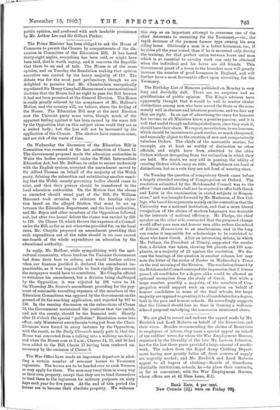On Tuesday the question of compulsory Greek came before a
largely attended meeting of Congregation at Oxford. The resolution submitted by the Hebdomadal Council was to the effect" that candidates shall not be required to offer both Greek and Latin in the examination in stated subjects in Respon- sions," and was brought forward by Mr. Matheson, of New Col- lege, who based his arguments mainly on the contention that the University was a national institution, and that a more liberal recognition of the claims of modern languages was desirable in the interests of national efficiency. Mr. Phelps, the chief speaker on the other side, contended that the proposed change would affect pass men and honour men alike, reduce the school of Literae Humaniores to an anachronism, and in the long run render it impossible for scholarships to be restricted to those who knew Greek. After an interesting debate, in which Mr. Pelham, the President of Trinity, supported the resolu- tion, a division was taken, showing 166 placets and 189 non- placets, or a majority of 23 against the resolution. We dis- cuss the bearings of the question in another column, but may note the letter of the rector of Exeter in Wednesday's Times on the real meaning of the 'division. The resolution framed by the Hebdomadal Council conveyed the impression that if it were passed, all candidates for a degree alike would be allowed an optional exemption from the study of Greek. But while a large number, possibly a majority, of the members of Con- gregation would support such an exemption on behalf of honour candidates in some of the final schools, the large majority are opposed to granting it to all candidates fora degree, both in the pass and honour schools. He accordingly suggests that the Council should lose no time in framing a well-con- sidered proposal embodying the concession mentioned above.






















































 Previous page
Previous page